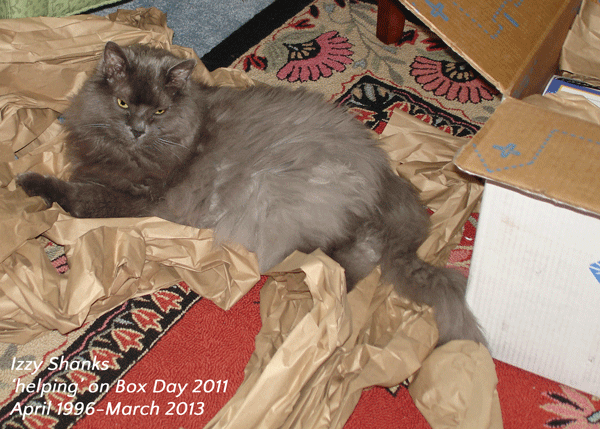Talking to Your Kids About the Death of a Pet
March 14, 2013
Last week, our family suffered a loss. On Tuesday, our 17-year-old cat, Izzy, started to exhibit end-of-life behaviors. Even though he was so old, a big part of me honestly thought he would rally… he always has in the past. But, as the day progressed, he stopped eating and drinking, he could hardly walk, he was lethargic and seemed to have trouble getting into a comfortable sleeping position (this was probably the sign that drew my attention the most – there was nothing that furry little guy like better than to pull up a lap and pass out!) When I went to get the mail, he was waiting by the door and wanted to get out. Those of you with escape-artist cats are probably thinking, “So what?” But Izzy was a more timid soul. Even if he plucked up the courage to venture into the wide world, he would be clamoring to get back in within 30 seconds:-) He was the epitome of an indoor cat.
Scott and I sat with him that night, and he purred on my soft robe. (He was normally a purring machine and hadn’t purred all day, so in retrospect, I see that was sort of a last effort on his part to love us.) I slept on the couch Tuesday evening in case he passed away in the night. I really didn’t want the boys to find him before I did. It was a very long night.
On Wednesday, he was worse. After talking to Scott about it and the both of us sitting down with the kids, I called the vet – who was able to translate my squeaked out, monosyllabic request for an appointment. The thought of losing him nearly broke my heart, but the thought of such a dear, good cat suffering was even worse. He had been a faithful friend through my entire adult life. I knew that it was only a matter of a few hours before he would be in really bad shape, and I wanted to save both the cat and the kids from having to go through that.
That afternoon, Scott came home early so he could take the kids out and about, while I said good-bye to my little buddy. It wasn’t easy, but I knew I had to do it. Afterwards, I was a wreck. I think God had given me just enough strength to stay the course and do what needed to be done, because when it was over, I was unbelievably sad. When the family came home, we all grieved together.
It was a heart-wrenching time, but as the days passed, I was able to watch the kids and see the workings of their hearts as they processed their loss. It crossed my mind that many of you may have found or may find yourself in this position. I thought it might be helpful to share how we handled talking to the boys about the death of their pet, as well as ask you all to share any additional tips you have found to ease the process. So, do feel free to share.
(Note – since changing to the WordPress platform, I have received copious amounts of spam comments. In order to keep the blog clean and useful, I now approve comments before they post. So, if you don’t see your comment immediately, never fear… I will get it online asap:-)
Be Honest
When we knew for certain the cat was fading, we sat the kids down and told them, in clear and simple terms. We told them that animals give us certain signs when their life is ending and that Izzy was exhibiting those signs. We let them know that he would soon be suffering and that by taking him to the vet, we would be saving him from a painful ending. We reminded them what a wonderful cat he had been and made sure they knew that we were helping him to go peacefully because of our love for him.
Be Brief
We let them cry when they needed to, but more than once over the course of those first days, we had to bring them out of their grief so they could catch their breath. We needed to give them a distraction so their hearts could rest and recover. This was especially true for our younger, more sensitive son. His grief was overwhelming him that first night. I told him to just picture a white wall in front of him. He is a very visual kids – just like his dad – so I told him that anytime an image invaded his thoughts, he could erase it so that the wall was white again. He could cry when he felt sad, but that white wall was always there for him if he needed to stop feeling sad for a while.
Kids are also remarkably resilient. They feel loss deeply, but are much more quick to return to daily life after a loss than grown-ups are. Watch for signs that they need normalcy. I was a little amazed that they seemed so much better than I was, in a shorter time frame. I had to be careful not to let my (longer) grieving process affect the healing that they were experiencing.
Be Bare
The kids haven’t often seen me cry. I used this opportunity to show them a little bit of my emotional side. They saw me cry for Izzy those first days. They now know first-hand that Mom and Dad can experience loss and can be sad and that everything will still be ok. That being said, they saw that sadness come from a self-controlled adult, not a mom who was a hot mess. (I saved the hot mess for moments for when I was alone:-) A parent who is a hot mess is scary to a child regardless of their age. A grieving child is already fearful and sad enough without feeling like they need to take care of you as well. While this is a good opportunity to be bare with your kids, that openness needs to be tempered with self-control.
Be Thankful
Healing comes from many places. For me, gratitude has been remarkably healing. I am so thankful for the long life of that cat, for his health, for his happy disposition. I am also thankful that his end was as good as I could have imagined it short of him going peacefully in his sleep. Scott and I have both talked to the kids about all of the joy Izzy brought us and how lucky we were to have him for so long. The silly stories and happy memories, while bittersweet, have their own healing power.
Be Aware
Everyone processes grief differently, and kids are usually more resilient than we think. As a parent, it was important for me to read them carefully and use this situation to teach them how to handle their emotions. I could see what they were feeling much more clearly than they could and give them words for their feelings.
I also had to make sure they weren’t trying to bear the weight of my feelings. For example, it took a few days before I really wanted to eat. I didn’t make big deal of it. I knew my appetite would come back (although…:-) But, they apparently noticed and kept trying to entice me to eat with Snickers and Swedish Fish, which really cracked me up. I was glad they were being thoughtful of others. After a few tries, though, I had to make it clear that I was in no danger of starving to death. I told them that my body was just working on getting through my sadness and that, eventually, I would have more energy for eating again. I could almost see the relief in their faces.
Be Flexible
As weird as it sounds, Izzy was like a big fluffy brother to the boys. Because we homeschool, he was always with us – reading on the couch, playing with scraps of paper from a project, or “talking” to us while we did math. They were used to having him around 24-7. When he was suddenly gone, it was like a big empty space settled into our home and our hearts. The days leading up to his death and the one after felt very foggy to all of us. I let them play much more than normal and suspended school for that time. We were just focused on the next breath and didn’t expect too much from ourselves.
Be Normal
That being said, daily routines are comforting forces in our lives that carry us safely from one day to the next. Childhood thrives on routine, and this can be especially true after a loss. We took a day after Izzy passed to be sad, but the day after that, I made it a point to start in on some schoolwork again. That may seem a little cold to some, but for us, it was crucial to get back into our daily lives and work. It also helped us work through so many of the touchpoints in the day that reminded us of Izzy. It was hard to do morning read-aloud time (a staple in our house) without him jumping up and sleeping on us while we read on the couch. But, after the first day, it became a little easier, and so on. We experienced many moments like that over the last week. But, our routines kept us going and working through them, which in turn was very healing in itself.
We still miss our cat. I truly believe God places certain animals in our lives and hearts as little mercies. I share our story with the hope that it can be helpful to your family if you find yourself in similar circumstances. Everyone’s experience with the loss of a pet and the accompanying grief is different. Some people can’t understand loving an animal, and others feel very deeply for their pets. I was certainly surprised at how heartbroken I felt. But, the beauty of love is more powerful than the loss, and I feel so blessed to have had my little companion for as long as I did. I like to think that, even as he left us, he gave us a parting gift… the opportunity to face a loss together as a family and grow closer because of it.

